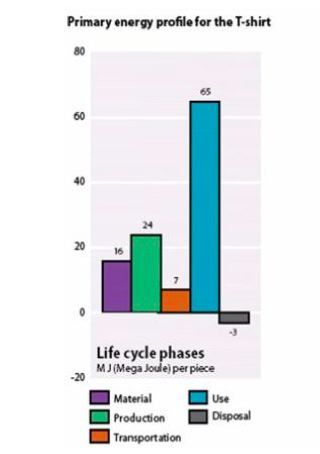Last year Tommy Hilfiger made headlines when he stated that he 'didn't wash his jeans for months,' and then, after a pause, added 'never.' The comment set off a maelstrom over the hygienic implications but also something else -- more and more people started to come forward and admit that they too wash their jeans "never." It's not just better for the jeans, it's better for the environment to wear more and wash less.
When examining the carbon footprint of apparel, especially something cotton like jeans or a t-shirt, it is shocking how much the impact increases once the consumer takes the product home. Resource inputs to grow, manufacture and transport garments to market all pale in comparison to the water and energy resources that get consumed once said item is in the hands of the wearer. Simply put -- laundering and washing consume the largest amount of resources and the largest carbon footprint in the life of the garment, whether it was produced domestically or abroad and we are drowning in the waste of washing.
Kate Fletcher, Reader in Sustainable Fashion at the Centre for Sustainable Fashion, London College of Fashion puts it this way, "Keeping clean used to be about disease prevention, but now the culture of whiter than white has weakened our immune systems, lined the pockets of detergent manufacturers and led to the startling fact that the energy needed to wash your favourite garment is about six times that needed to make it."
And now jean wearers, be they the new raw denim wearer or someone like Hilfiger referring to his Levi's, are all coming clean that they 'never wash.' The CEO of Swedish denim company Nudie, Palle Stenberg says of his own jeans, "Here is a pair I've been wearing every day for at least two years. Can you see the repairs? If I turn it inside out ... you can see repairs. That's the idea. Buy a pair of organic jeans, never wash them and you wear them and wear them and wear them and they become like a second skin."
To further cement the normalcy of this idea, a student and researcher at the University of Alberta tested the bacteria content of jeans worn for 15 months, and found that the bacteria levels in the jeans were similar post-wash and pre-wash. Further proof to Fletcher's point that washing clothes is "a habit and an activity closely tied in with social acceptance, personal and romantic success and happiness," and not at all based on hygienic necessity.
Want ways to reduce your closet's carbon footprint, use these these never wash tips:
Worried about bacteria: place clothing in a sealed bag in the freezer overnight, up to 72 hours for maximum bacteria killing effect, this will also reduce any odor on the garment
Worried about odor: hang the garment outside. Whites will also benefit from bacteria reduction in direct sunlight
Sweat stains: buy or make underarm shields that can be removed and washed when necessary, reducing the need to wash tops, sweater and shirts
Heavy dirt or surface stains: wear the item into the shower or spot clean with a lightly damp cloth
Image: University of Cambridge Institute for Manufacturing (2006) Well Dressed? The Present and Future Sustainability of Clothing and Textiles in the United Kingdom
